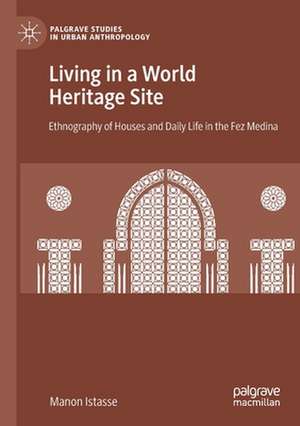Living in a World Heritage Site: Ethnography of Houses and Daily Life in the Fez Medina: Palgrave Studies in Urban Anthropology
Autor Manon Istasseen Limba Engleză Paperback – 14 aug 2020
| Toate formatele și edițiile | Preț | Express |
|---|---|---|
| Paperback (1) | 386.39 lei 6-8 săpt. | |
| Springer International Publishing – 14 aug 2020 | 386.39 lei 6-8 săpt. | |
| Hardback (1) | 508.11 lei 6-8 săpt. | |
| Springer International Publishing – 16 iul 2019 | 508.11 lei 6-8 săpt. |
Din seria Palgrave Studies in Urban Anthropology
-
 Preț: 545.90 lei
Preț: 545.90 lei -
 Preț: 390.63 lei
Preț: 390.63 lei -
 Preț: 386.81 lei
Preț: 386.81 lei -
 Preț: 190.32 lei
Preț: 190.32 lei - 15%
 Preț: 643.00 lei
Preț: 643.00 lei - 15%
 Preț: 584.26 lei
Preț: 584.26 lei - 15%
 Preț: 645.60 lei
Preț: 645.60 lei - 15%
 Preț: 641.71 lei
Preț: 641.71 lei - 18%
 Preț: 737.43 lei
Preț: 737.43 lei -
 Preț: 393.90 lei
Preț: 393.90 lei -
 Preț: 390.25 lei
Preț: 390.25 lei - 18%
 Preț: 781.00 lei
Preț: 781.00 lei - 15%
 Preț: 640.24 lei
Preț: 640.24 lei - 18%
 Preț: 781.62 lei
Preț: 781.62 lei - 18%
 Preț: 729.06 lei
Preț: 729.06 lei - 15%
 Preț: 582.45 lei
Preț: 582.45 lei - 18%
 Preț: 779.08 lei
Preț: 779.08 lei - 18%
 Preț: 894.34 lei
Preț: 894.34 lei - 18%
 Preț: 781.94 lei
Preț: 781.94 lei -
 Preț: 387.58 lei
Preț: 387.58 lei
Preț: 386.39 lei
Nou
Puncte Express: 580
Preț estimativ în valută:
73.94€ • 79.06$ • 61.65£
73.94€ • 79.06$ • 61.65£
Carte tipărită la comandă
Livrare economică 18 aprilie-02 mai
Preluare comenzi: 021 569.72.76
Specificații
ISBN-13: 9783030174538
ISBN-10: 3030174530
Pagini: 293
Ilustrații: XIX, 293 p. 15 illus., 14 illus. in color.
Dimensiuni: 148 x 210 mm
Greutate: 0.38 kg
Ediția:1st ed. 2019
Editura: Springer International Publishing
Colecția Palgrave Macmillan
Seria Palgrave Studies in Urban Anthropology
Locul publicării:Cham, Switzerland
ISBN-10: 3030174530
Pagini: 293
Ilustrații: XIX, 293 p. 15 illus., 14 illus. in color.
Dimensiuni: 148 x 210 mm
Greutate: 0.38 kg
Ediția:1st ed. 2019
Editura: Springer International Publishing
Colecția Palgrave Macmillan
Seria Palgrave Studies in Urban Anthropology
Locul publicării:Cham, Switzerland
Cuprins
Acknowledgements.- List of Abbreviations.- List of Pictures.- Chapter 1: Introduction.-Chapter 2: Fez.- Part I: Houses in Fez: A Materialist Approach.- Chapter 3: Undertaking Work in a House.- Chapter 4: Furnishing and Decorating a House.- Chapter 5: Intimacy, Hospitality and Tradition in Tourist Accommodation.- Part II: Attachment to Houses: Home and Heritage.- Chapter 6: Sensual, Affective, and Cognitive Relations with Houses.- Chapter 7: From Conflicts to the Attachment to Houses.- Part III: Heritage in Fez.- Chapter 8: Heritage: Forms, Grammar, and Circulation.- Chapter 9: Conclusion.- Glossary.- Index.
Notă biografică
Manon Istasse is a Postdoctoral Researcher at the Laboratoire d’Anthropologie de Mondes Contemporains (LAMC) at Université Libre de Bruxelles, Belgium.
Textul de pe ultima copertă
Through a thick ethnography of the Fez medina in Morocco, a World Heritage site since 1981, Manon Istasse interrogates how human beings come to define houses as heritage. Istasse interrogates how heritage appears (or not) when inhabitants undertake construction and restoration projects in their homes, furnish and decorate their spaces, talk about their affective and sensual relations with houses, face conflicts in and about their houses, and more. Shedding light on the continuum between houses-as-dwellings and houses-as-heritage, the author establishes heritage as a trajectory: heritage as a quality results from a ‘surplus of attention’ and relates to nostalgia or to a feeling of threat, loss, and disappearance; to values related to purity, materiality, and time; and to actions of preservation and transmission. Living in a World Heritage site provides a grammar of heritage that will allow scholars to question key notions of temporality and nostalgia, the idea of culture, the importance of experts, and moral principles in relation to heritage sites around the globe.
Caracteristici
Examines the relationship of residents in the Fez medina to the medina as a world heritage site Presents an important perspective on heritage using an urban ethnographic approach Ties together ethnographic investigations from the perspectives of the residents themselves with theoretical notions and debates across Anthropology
